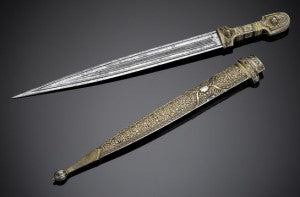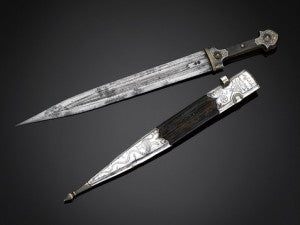Weapons are some of the most intriguing antique pieces, possessing both a tangible strength of material and a symbolic strength of a nation and its people. A few of my historical favorites that we have in the gallery right now are these three elegant antique daggers. With intricate designs and workmanship, and the unyielding form of a serious weapon, these pieces wonderfully embody daggers as both a status symbol and a means of defense.
Known for their impeccable military skills, the Eastern Slavic Cossack people crafted equally impressive weapons. The Cossacks migrated from areas of Georgia and southern Russia to escape endemic regional political persecution by banding together in small settlements for protection. Under the Tsars, the Cossacks were allowed great autonomy in exchange for military service and protection of the Russian frontier regions. Many of their customs of dress and weaponry, including the kindjal, were accepted and adapted by mainstream culture. Even the Tsars were known to wear the traditional long black robe with the kindjal worn on the side, an ensemble which is still worn by Cossacks today.
The kindjal – a dagger-like weapon– was designed for close hand to hand combat with its double-edged, broad blade. The hilt, grip and scabbard mounts of this Georgian example are decorated in fine niello inlay and gold gilt. Intended to be both a fashion accessory and an essential side arm, this particular kindjal dates to the early 20th century, a very turbulent time in Imperial Russia. The piece bears Georgian makers marks, making it a fine example of a collectable kindjal.
Another Russian Cossack example we have is equally beautiful, and one assumes, brutally efficient. This kindjal boasts fine granulated gold and silver nielo inlay on the hilt and a well forged blade with deep offset fullers. A gold makers mark signed to owner on reverse dates the piece circa 1900.
The incredible beauty of this Persian dagger belies its dangerous capabilities. This stunning weapon features a hilt and scabbard of bronze inlaid with a silver vine motif. Crafted in the jambiya style, this knife has a double-edged, curved blade and is meant to be worn on a belt, with a metal loop integrated into the design of the scabbard. Found in many countries influenced by Arabian culture, the jambiya is a prized possession, worn by men as both a status symbol and as a means of defense. To find one of such elegance and fine workmanship in the West is extremely rare.
Swords, daggers, kindjals and the myriad other forms of side arms are extremely collectible pieces. They excite the eyes as much as the imagination. Click here to learn more about M.S. Rau’s collection of weapons and to explore these powerful pieces of history.






